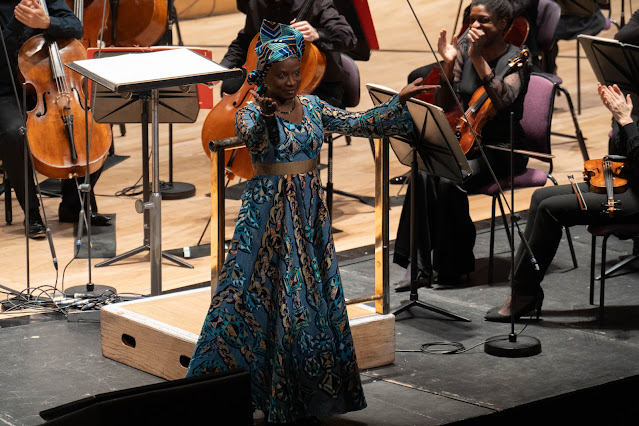 |
| Philip Glass: Ifè: Three Yorùbá Songs – Angélique Kidjo, The Hallé – The Bridgewater Hall, Manchester (Photo: Sharyn Bellemakers/The Hallé) |
Philip Glass: Days and Nights in Rochina; Ifè: Three Yorùbá Songs (UK première), Eleventh Symphony; Angélique Kidjo, The Hallé, conductor: Robert Ames; Bridgewater Hall, Manchester
Philip Glass: Águas da Amazônia, Glassworks; musicians from the Hallé and RNCM, conductor: Colin Currie; RNCM Concert Hall, Manchester
Philip Glass: LIFE: A Journey Through Time, arranged for orchestra by Michael Riesman; Concepts/images: Frans Lanting, visual choreography/technical direction: Alexander V. Nichols, life project editing: Christine Eckstrom, introduction narrated by Peter Coyote, conductor: Colin Currie; Bridgewater Hall, Manchester
Reviewed by Tony Cooper (13-15 February 2025)
Philip Glass’ music is instantly recognizable with its pulsating rhythms, hypnotic repetition and slowly shifting patterns of notes. His music seems to fit somewhere between classical and rock intricately constructed and filled with familiar chords punctuated by clean-cut electronic sounds
The opening concert of this valued Philip Glass Festival, on 13 February 2025, presented by the Hallé in collaboration with the Royal Northern College of Music (RNCM), fell to Days and Nights in Rocinha (subtitled ‘Dance for Orchestra for Dennis Russell Davies’) offering a fitting tribute to the poor and deprived Rio de Janeiro neighborhood of Rocinha located between Gávea, São Conrado and Vidigal. The proximity between the upper-class residences of the first two mentioned and the lower-class residences of Rocinha marks a profound urban contrast in the region’s landscape, often cited as a symbol of social inequality in Brazil.
Receiving its first performance on 8 February 1998 by Radio Symphonie Orchester Wien (also the commissioning body) conducted by Dennis Russell Davies, Days and Nights in Rocinha focuses upon the neighborhood’s annual Carnival of fun, food and music – one of the highlights of their cultural calendar.
Philip Glass made frequent visits to Rocinha leading up to the Carnival thoroughly enjoying the event’s unique development therefore his musical impression and tribute to this eponymous favela evolves over a 23-minute work with the strings capturing so well the Latin-flavoured atmosphere of what is a sophisticated, gentle and intricate work so lovingly punctuated by the relaxing, pulsating and melodic opening bars as Glass gives a big nod to Ravel’s haunting, mystical and well-loved work, Bolero.
Here the percussion section adds so much to the drama and the overall excitement of the piece while the brass section particularly the bass slide trombone and bass tuba had quite a say in the matter while a host of excited xylophone runs were complemented by timpani, snare drum (and other ‘knocking’ instruments of all shapes and sizes) adding greatly to the intricacies and texture of the score overall while highlighting the fun and temperament of this Carnival-inspired work.
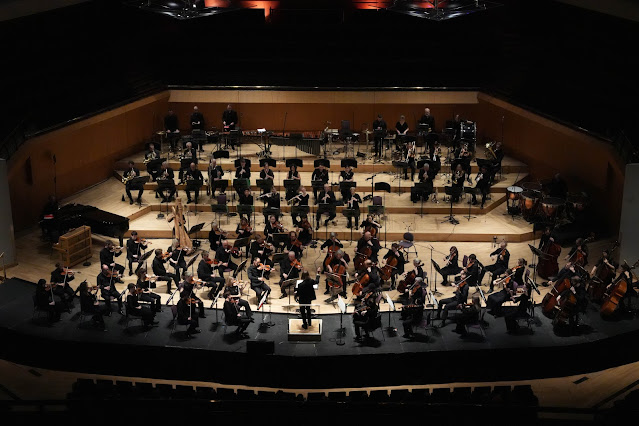 |
| Philip Glass Festival – The Hallé, Robert Ames – The Bridgewater Hall, Manchester (Photo: Sharyn Bellemakers/The Hallé) |
The second work in this thrilling opening concert of the Philip Glass Festival at Bridgewater Hall introduced an enthusiastic and appreciative house to the UK première of Ifè: Three Yorùbá Songs commissioned and premièred by Philharmonie Luxembourg and Orchestre Philharmonique du Luxembourg on 17 January 2014 conducted by Jonathan Stockhammer.
Performed by singer/songwriter, Angélique Kidjo, she was once again on the platform but this time at Bridgewater Hall in league with the Hallé conducted by the English-born conductor/violist, Robert Ames, who holds the positions of co-artistic director and co-principal conductor of the London Contemporary Orchestra and a well-respected conductor of works by Glass.
Five-time Grammy Award winner, Ms Kidjo (who, incidentally, performed at the grand re-opening of Paris’ Notre-Dame Cathedral) is a skilled interpreter of Glass’ work and Ifè Songs, especially written for her, prompted the composer to say that ‘Angélique and I have built a bridge that no one has ever walked before’. Such prophetic words, indeed! However, Ifè Songs (which Ms Kidjo tours the world performing this high-energy work with her four-piece band) proved an excellent choice.
A stylish and well-presented performer, Ms Kidjo (born in Ouidah, French West Africa, now Benin) harbours a strong articulated voice and dominates the stage at every conceivable turn. Her intonation is excellent and heard to such good effect in a concert hall offering clear and bright acoustics that I can only equate to that of the Gewandhaus in Leipzig.
And in Ifè Songs – a lovely setting of three poems telling of the Yorùbán creation myth – Ms Kidjo (singing through a microphone) complemented so well the acoustic nature of the orchestra. Attired in a long-flowing blue-and-gold dress adorned by a geles (a folded head wrap) Ms Kidjo simply looked radiant.
The final work in this thrilling and satisfying opening concert of this compact Philip Glass Festival fell to a performance of Glass’ Eleventh Symphony commissioned by the Bruckner Orchestra Linz, Istanbul International Music Festival and the Queensland Symphony Orchestra, received its première on 31 January 2017 in Carnegie Hall thereby marking Glass’ 80th birthday with Dennis Russell Davies conducting the Bruckner Orchestra Linz.
A three-movement work (all under 15 minutes in length) the Eleventh begins softly and in true Glass style slowly builds and develops into a bastion of orchestral strength with brass to the fore admirably complementing the soft, cool playing of the strings with their rising and falling melodies keeping one’s strict attention to the musical line while the percussion section (there were eight players raring to go!) seemingly working overtime on a wide varied of instruments thereby offering the work a substantial musical base.
Suddenly, in a sharp interruption, in true Glass style, the listener enters the second movement in which the composer incorporates a popular melody from Satyagraha, a work that English National Opera first staged in association with The Met, New York at the London Coliseum in 2007 directed by Phelim McDermott. Such was its success the opera is widely recognized as cementing an extremely good relationship between Glass and ENO.
In fact, ENO’s production of Satyagraha became the ‘first’ in the ongoing partnership between Phelim McDermott (co-founder of Improbable with Julian Crouch) and English National Opera which became known as the ‘House of Glass’. An outright and riveting success, Satyagraha broke box-office records, too, thereby making it one of the most popular contemporary operas ever to be staged by ENO. As such it has enjoyed four revivals in 2010, 2013, 2018, 2021. [see Tony’s review of the 2018 revival]
The last movement of the Eleventh perfectly shows why Glass is seen as a master of developing complex and ever-shifting sonic layers from simple, repetitive structures. He simply and quietly employs a snare drum to lift the movement off the ground in a military marching tempo style. Other percussionists soon join the action as Glass’ riveting score quietly builds up until full strings, woodwind and brass offers a grand and imposing ending that came too soon. The audience were in raptures.
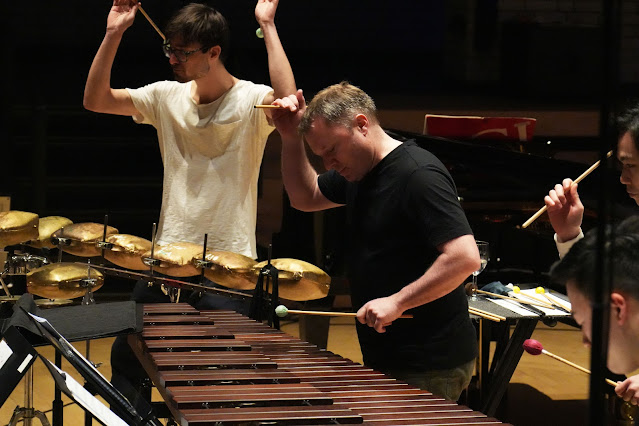 |
| Philip Glass: Águas da Amazônia – musicians from RNCM, Colin Currie – RNCM (Photo: Alex_Burns/The Hallé) |
Held at the RNCM Concert Hall on 14 February 2025, the second offering of the Philip Glass weekend featured a couple of terrific works comprising Águas da Amazônia and Glassworks. Originally composed in 1993 for the ballet company of Belo Horizonte, Grupo Corpo, under the name Seven or Eight Pieces for a Ballet, Águas da Amazônia (Portuguese for ‘Waters of the Amazon’) came about by the introduction of Marco Antônio Guimarães, who founded the splendid Brazilian instrumental group Uakti (pronounced ‘wah-ke-chee’) and Philip Glass by Paul Simon.
Incidentally, the name of the group, known for using custom-made instruments delicately crafted by its member, derives from a Tucano native South American legend inasmuch as Uakti was a mythological being who lived on the banks of the Rio Negro. His body was peppered with a myriad of holes which, when the wind passed through them, produced sounds that bewitched the womenfolk of the tribe. Therefore, he was hunted down and killed by the menfolk. Palm trees sprouted up in the place where his body was buried and the people used these to make flutes that made such enchanting sounds.
Performed by advanced students from the RNCM (Arthur Barras, Ho Yin Wong and Ranco Liu) under the direction of Colin Currie, this awe-inspiring all-percussive work draws inspiration from the Amazon waters with tones of classical, new age and jazz entwined within its pleasing and inviting score.
The work’s first recording was performed by Uakti comprising Artur Andrés Ribeiro, Paulo Sérgio Santos and Décio Ramos under Guimarães’ direction. Although the total number of items in the work numbers ‘ten’ only three were heard in this lunchtime concert – ‘Madeira River’, ‘Xingu River’ and ‘Amazon River’ – all rather short pieces, none lasting more than seven minutes in length. The hardware on stage could be said to mirror an art installation, stuff was all over the show ranging from traditional-type percussive instruments such as vibraphones and bongos to a bass drum and marimba plus ‘crotales’ – often referred to as ‘antique cymbals’.
About 10cm in diameter, ‘crotales’ (the name originating from the Greek word ‘crotalon’ meaning ‘castanet’) are made of small-tuned bronze or brass discs neatly fitting a flat top surface with a bulge at the bottom. They’re commonly played by bowing, being struck by a hard stick or mallet or played by striking two discs together in the same manner as hand cymbals. Their sound conjures up a small-tuned bell but offers a much brighter sound and a much longer resonance.
Following the success of his larger-scale orchestral and stage creations, Philip Glass felt the urge to write something that would be more accessible to a wider audience. Therefore, he came up with Glassworks in 1981, a work in six short, sharp movements pop-orientated and written with easily accessible and digestible tracks to fit in with the swishy and upbeat lifestyle of the Walkman generation.
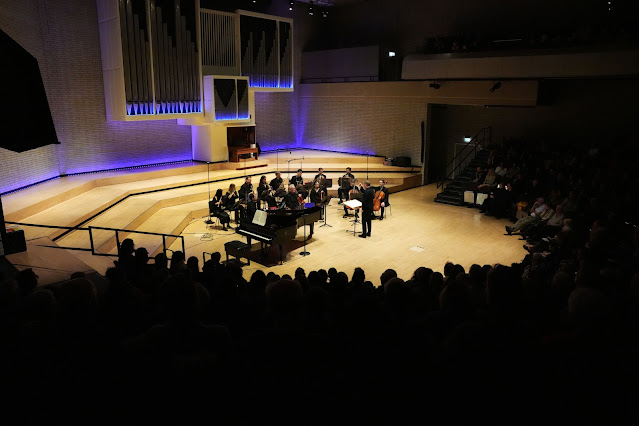 |
| Philip Glass: Glassworks – musicians from RNCM & The Hallé, Colin Currie – RNCM (Photo: Alex_Burns/The Hallé) |
Intending the work to be aptly for the decade of the Walkman era, Glass released both an LP and a tape cassette of the piece. Each had its own separate mix: the LP was intended for home listening and the cassette, with a headphone-specific mix, was, of course, intended for personal tape players.
Glass’ efforts paid off handsomely and the work became an instant success – one of Glass’ cult iconic works in fact. Chamber piece it may well be but it’s no less rich and varied in its rhythms and textures than some of the composer’s larger-scale compositions as it uses members of all the instrument families thereby creating a shimmering, anthemic sound through a mixer.
A prime example of Glass’ writing, Glassworks (which, incidentally, I heard in Cambridge only last year performed by the Philip Glass Ensemble directed by Michael Riesman, see review) is a soothing and spellbinding piece to say the least intricately constructed yet filled with familiar chords and clean electronic sounds. The pulsating arpeggio soundscape, for instance, is thoroughly engaging and strongly illuminating thereby demonstrating Glass’ definitive style of music comprising repetitive structures thus creating a shifting, hypnotic effect which I found immersive and meditative with more than a spiritual leaning to it.
Glassworks opening bars witnesses Pete Durrant at a grand piano playing the best part of ten minutes bar upon bar of linear-structured wave-like chords in a style not too dissimilar to the music of that great baroque master, JS Bach, a composer greatly favoured by Glass. Six members from the Hallé were shadowed by six advanced students from RNCM therefore flutes were Sarah Bennett (Jessica Pun Lai Yeun); soprano saxophone/clarinet, Rob Buckland (Eleanor Williams); tenor saxophone/bass clarinet, Carl Raven (Aaron Lo); Horns, Matthew Head (Toby Johnson-Jones); violas, Julian Mottram (Jeanette Szeto); cellos, Jonathan Pether (Daniel Shearer).
Out of the six movements that make up Glassworks I found myself transfixed on No.5, ‘Façades’, scored for solo soprano saxophone, soprano saxophone, viola, cello and synthesizer. And Rob Buckland taking the soprano saxophone line focused on a series of pounding repetitive phrases freely floating over the keyboards with such consummate ease. The work ended with Durrant back at the grand piano but this time round playing in league with the full ensemble thereby bringing this thrilling and engaging work and concert to a fulfilling and rewarding close.
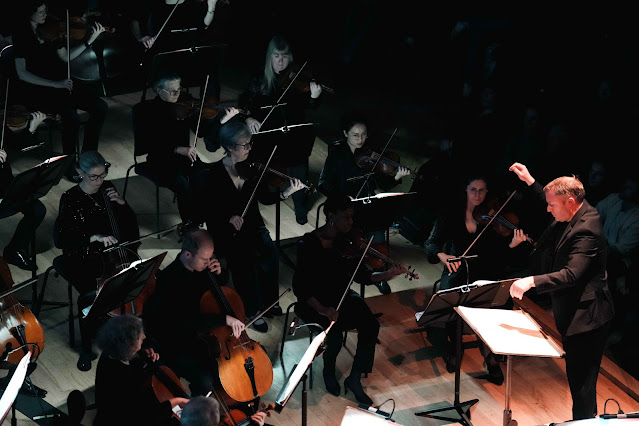 |
| Philip Glass: LIFE: A Journey Through Time – The Hallé, Colin Currie – The Bridgewater Hall, Manchester (Photo: David Hughes/The Hallé) |
The final offering of this amazing and successful Philip Glass Festival on 15 February fell to the multi-media work created by National Geographic photographer Frans Lanting in collaboration with Philip Glass celebrating the splendour of life on earth through some telling music and a wide and varied range of striking images. Entitled LIFE: A Journey Through Time, the piece was punctuated by Lanting’s stunning photography projected on to a cinemascope-type screen sited high above and behind the orchestra with Glass’ hallmark writing contributing so much to a wonderful, stimulus and entertaining multimedia show.
It was a major project for Lanting to undertake as he embarked upon a six-year journey of photographic discovery paralleling new scientific insights concerning the evolution of life on earth. The result turned out to be a lyrical interpretation of life on our planet from its earliest beginnings to its present diversity ranging from prehistoric trilobites to giant tortoises and ranging from delicate jellies to spiny octopus trees and not least by erupting volcanoes to shimmering coral reefs.
Commissioned by the Cabrillo Festival of Contemporary Music, Santa Cruz, California, LIFE premièred on 29 July 2006 by the Cabrillo Festival Orchestra conducted by Marin Alsop who, deeply committed to contemporary music, was director of Cabrillo for 25 years overseeing 174 première performances. Roughly speaking, an hour-long work, LIFE is a mix of evolving textures mirroring the ever-changing landscape of life over seven episodes. A thoroughly immersive audio-visual experience, it proved an emotionally-charged journey through time ranging from the Big Bang to the present day.
Glass came up with an appealing filmic-endorsed score duly arranged for orchestra by Michael Riesman, music director of the Philip Glass Ensemble (PGE) and conductor of most of the composer’s film scores while visual choreography/technical direction was conceived by Alexander V. Nichols and life project editing by Christine Eckstrom with concepts/images by Frans Lanting whom, I’m pleased to say, graced the performance offering it a short introduction while proudly (and deservedly so) taken a bow at the end of the show with Colin Currie.
Interestingly, all the seven sections of LIFE came from previously existing music in the Glass catalogue originally written for smaller ensembles or solo instruments and, of course, presented for the first time by arrangements for full orchestra thereby witnessing the Hallé, conducted by Colin Currie, on top form. Are they ever off it?
Therefore, the music for the opening section ‘Elements’ – following on an introduction narrated by Peter Coyote – came from parts of ‘Seward Sanatorium’ and ‘Mina on the Terrace’ from the score for Tod Browning’s film Dracula; section II ‘Into the Air’ came from parts of The Somnambulist and ‘She Took the Path’ from Les Enfants Terribles; section III ‘Out of the Sea’ came from ‘Brazil’ from Orion; section IV ‘On Land’ came from parts of a new untitled piano piece which became part of film score for Shirin Neshat’s short film, Passage; section V ‘Beginnings’ came from parts of the overture and ‘Paul’s End’ from Les Enfants Terribles; section VI ‘Out of the Dark’ came from parts of Promenade in the Garden followed by part of ‘Belle Goes to the Castle’ from La Belle et La Bête, the French surrealist romantic fantasy film directed by Jean Cocteau while the final section ‘Planet of Life’ came from the score for Peter Greenaway’s short film, The Man in the Bath.
The last word goes to the pioneer of electronica, Brian Eno, who aptly described the music of Philip Glass as ‘a viscous bath of pure, thick energy’. I couldn’t agree more. Thank you!
The blog is free, but I’d be delighted if you were to show your appreciation by buying me a coffee.
Elsewhere on this blog
- Reclaiming Love: An Alternative Valentines Song in the City’s contribution to LGBT History Month including rare Smyth & Grieg plus Brahms’ Love Song Waltzes – review
- An enormously intense, personal experience: composer Michael Zev Gordon on writing A Kind of Haunting, his new piece inspired by his family’s experience of the Holocaust – interview
- Letter from Florida: It is hard to imagine any orchestra getting closer to playing as one, though, than The Cleveland Orchestra – concert review
- A woman on the edge: Cherubini’s Médée in the original French version yet given a powerful modern twist with Joyce El-Khoury – opera review
- To create modern culture through the thoughts of the past: George Petrou artistic director of the Göttingen International Handel Festival introduces this year’s festival – interview
- Another crazy day: Joe Hill-Gibbins’ production of Mozart’s The Marriage of Figaro returns to ENO reinvigorated – opera review
- My Heart’s in the Highlands: the debut recital from tenor Glen Cunningham mixes Stuart MacRae’s new songs with other composers with ‘Scotland in Mind’ – record review
- Unbearable intensity: musically strong revival of Janáček’s Jenůfa at the Royal Opera with incoming music director Jakub Hrůša on searing form in the pit – opera review
- Schubert’s Birthday at Wigmore Hall: Konstantin Krimmel in overwhelming form, with a welcome group of Carl Loewe too – concert review
- Bruckner’s obsession with death, Scottish Gaelic folk poetry & a grumpy gaboon: Scottish composer Jay Capperauld, Scottish Chamber Orchestra’s associate composer – interview
- Home









